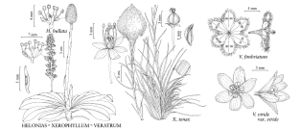Difference between revisions of "Helonias bullata"
Sp. Pl. 1: 342. 1753.
FNA>Volume Importer |
imported>Volume Importer |
||
| (One intermediate revision by the same user not shown) | |||
| Line 8: | Line 8: | ||
}} | }} | ||
|common_names=Swamp-pink | |common_names=Swamp-pink | ||
| + | |special_status={{Treatment/ID/Special_status | ||
| + | |code=F | ||
| + | |label=Illustrated | ||
| + | }}{{Treatment/ID/Special_status | ||
| + | |code=E | ||
| + | |label=Endemic | ||
| + | }} | ||
|basionyms= | |basionyms= | ||
|synonyms= | |synonyms= | ||
| Line 46: | Line 53: | ||
|publication title=Sp. Pl. | |publication title=Sp. Pl. | ||
|publication year=1753 | |publication year=1753 | ||
| − | |special status= | + | |special status=Illustrated;Endemic |
| − | |source xml=https:// | + | |source xml=https://bitbucket.org/aafc-mbb/fna-data-curation/src/2e0870ddd59836b60bcf96646a41e87ea5a5943a/coarse_grained_fna_xml/V26/V26_49.xml |
|genus=Helonias | |genus=Helonias | ||
|species=Helonias bullata | |species=Helonias bullata | ||
Latest revision as of 21:15, 5 November 2020
Plants 1–3 dm in flower, 6 dm in fruit. Leaves dark green, 9–35 × 1.5–4 cm; bractlike leaves broadly triangular, 1–2 cm. Racemes 30–70-flowered, ovoid in flower, 2.5–10 cm, elongate in fruit, 10–17.5 cm. Tepals 4–9 mm; filaments filiform, 5–6 mm; anthers blue, 0.75–1 mm; styles 1.4–2.5 mm; pedicel 5–8 mm. Capsules obcordate, 3–8 × 8–10 mm. Seeds whitish brown, 4–6 mm. 2n = 34.
Phenology: Flowering late spring–early summer.
Habitat: Swamps, bogs, and pocosins of the Blue Ridge Mountains and northern coastal plain
Elevation: 0–1100 m
Distribution

Del., Ga., Md., N.J., N.Y., N.C., S.C., Va.
Discussion
Helonias bullata is threatened in several eastern coastal states (R. D. Sutter 1984). Linnaeus cited Pennsylvania as the type locality, but probably his material came from the New Jersey pine barrens, and all Pennsylvania populations are introduced (E. T. Wherry et al. 1979; F. H. Utech 1980). This species has horticultural potential in wet gardens.
Selected References
None.
